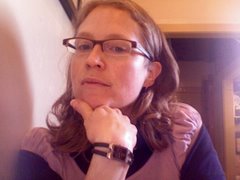Bill defeated a highly accomplished group of spellers this week ("only" ten, total, but I think only one person needed to use a second chance in the Round of Second Chances, and only one person was eliminated before that).
The rennaissance-man spelling champion (of at least three spelling bees that I know of), writer, professor, lawyer, man of the cloth, and problably more, has a great website.
He wrote a bit about the Bee this week:
... (O)n June 11, I ventured up to Portland again with a friend to participate in the weekly bee at the Mississippi Pizza Pub. The pub is one of the most interesting club/restaurant/hang out venues on the East Side of the Willamette. I love the easy atmosphere and friendly patrons. The spelling bee at the Pub began in January, and it is made more attractive by the excellent pronunciation and spirit injected into it by pronouncer, judge and general emcee Katherine Woods (I almost wrote "Words")-Eliot.
...(T)here were "only" ten competitors, we each were intelligent and even accomplished spellers. As is usual, Katherine "eases us in" to the competition by giving us two rounds of simple or "middling" words. We had "frustrated" and "gestalt," for example, while the only person who misspelled a word in the first two rounds missed the word "middling." The third round saw the onslaught of more difficult words, starting with lepidopterology, as well as the special rule which allows a person to get a "second try" on words this round. Most people didn't need that second try, however, because the remaining nine spellers breezed through the words.
The words got more difficult. I had matutine and pleiotropic, which I spelled correctly to the appreciation of the crowd. Another person correcly spelled obnebulate, which I might even have missed because the definition given ("becloud") I knew to be the definition of obnubilate. Turns out that the Unabridged lists both words, which both mean the same thing. A quick OED search on them says that both originated in the mid-16th century. So, we have two words meaning the same thing, both of which no one uses. Well, some people have three cars and only use one. The words roundlet (16th century hat) and nonnegotiable and recrement and myology and patriarchally and fain and hoary and plumose and koto were spelled correctly, and I thought we were going to be in for a long evening.
Three other words I had are also worthy of note: Euterpean, jornada and isotopic. The last isn't too bad, as long as you know the word "isotope" from your first-year chemistry class. Jornada (pronounced "hornada") wasn't bad, as soon as Katherine told me it was of Spanish origin). But Euterpean made me pause for a moment. I knew that Euterpe was one of the nine Muses of Greek mythology, but I had to stop and think whether the ending would be "ian" or "ean." I asked for the language of origin, and she told me it was "Greek." Greek uses "ean" as an ending. An example, which I have both gotten wrong and right (wrong once, right twice) at other bees is Terpsichorean. Terpsichore was Euterpe's sister. Thus, I figured that you had to spell them similarly.
Missed Words
So we kept going until a few spellers began to fade. Usually the thing that catches people is whether you have an "a" or "e" or "o" as an interior vowel when the word is pronounced as if the vowel is simply a "schwa." One person, for example, missed the word viviparous by placing an "e" after the "p" instead of the "a." One spelled nonagesimal mistakenly as nonegesimal. One person misspelled korrigan, the name of a fairy or witch in Breton folklore, noted especially for stealing children, by spelling it with an initial "c." Finally, there were two of us remaining: a woman and myself. I was given the word normothermia to spell. I had never heard of the word, it isn't in the Collegiate dictionary, and it was, as I have since discovered, a new word in the 1993 Unabridged. Yet, its first attestation in English goes back to the late 19th century, even though the OED gives us the first complete sentence with normothermia in 1949. "Normothermia is that range of normal environmental temperature at which there is neither stimulation nor depression of the activity of the cells." It is, in short "normal body temperature." I misspelled it, putting an "a" between the "m" and "t." My competitior also misspelled it, placing an "e" there. So, we were on to the next word, which my opponent also misspelled but which I then got right (I forget it now). My final word was koan which, to a former religious studies professor and an avid reader of David James Duncan in the past (he wrote "Mickey Mantle Koan"), was straightforward. So, I took the palm last night, even though I had misspelled one word along the way.
Here's the entire essay.
Friday, June 15, 2007
Subscribe to:
Post Comments (Atom)

No comments:
Post a Comment